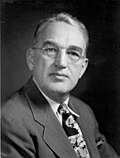Democratic nomination
Campaign
U.S. Senator James M. Mead, who had contested the nomination in 1942 but lost to John J. Bennett Jr. at the state convention, was an early candidate for the nomination. By December 1945, he had secured the support of most upstate county chairs, who had supported Bennett in 1942. [3] Nevertheless, James A. Farley, who had led the opposition to Mead's nomination in 1942, and state chairman Paul E. Fitzgerald remained opposed. Farley reiterated his opposition in April, harshly criticizing Mead as guilty of "plain, unadulterated deceit" and lacking "the stability and forthrightness to be Governor". He declared Mead was "afraid of the job and his fear was warranted" and would be a "terrible Governor" and easily defeated by Dewey. [4]
This page is based on this
Wikipedia article Text is available under the
CC BY-SA 4.0 license; additional terms may apply.
Images, videos and audio are available under their respective licenses.



